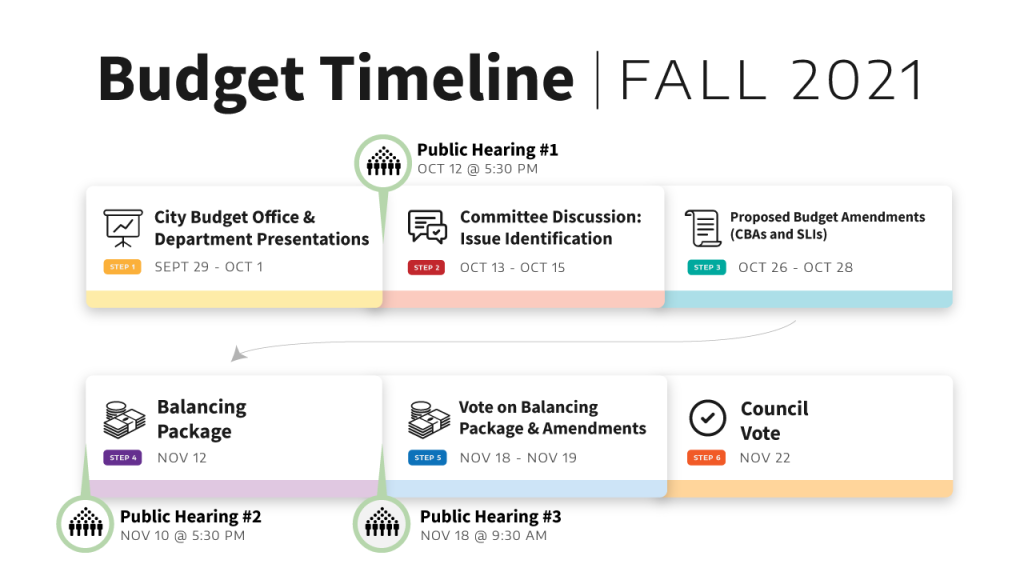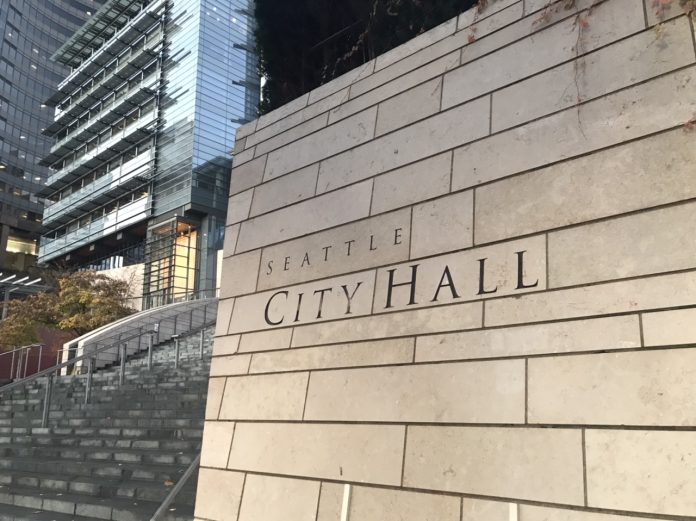The Seattle City Council has prepared more than 200 amendments to Mayor Jenny Durkan’s 2022 budget proposal.
Among them are amendments that would initiate work to reform design review, increase outreach staffing to address Seattle’s inequitable zoning, and rededicate JumpStart funding to its original intent when the council passed it.
The first batch was released this morning in advance of budget committee sessions tomorrow and would impact agencies such as the the Seattle Department of Construction and Inspections (SDCI), the Office of Planning and Community Development (OPCD), and the Office of Sustainability and Environment (OSE). Other major departments will go later in the week. The hearing for the Seattle Department of Transportation (SDOT) will be Thursday, for example, while the Office of Housing, Seattle Police Department (SPD), Homelessness Response, and Seattle Parks have Wednesday sessions. Watch out for later coverage of SDOT and SPD amendments.
Those later sessions could shows lines of contention. The Mayor has proposed hiring 125 new police officers next year, and the City Council may not see eye to eye on that. She has also added $2.4 million to restart the Center City streetcar project that she keeps pausing and undermining, which has already gotten flagged by some councilmembers.
SDCI amendments tackle design review delays and tree protections
Councilmembers have brought 11 amendments affecting SDCI’s budget.
Councilmember Dan Strauss, who chairs land use committee, authored three amendments related to the City’s design review program, which has come under heat for the delays it’s causing to housing projects. Those Strauss amendments are:
- Amendment 1: $150,000 allocation to SDCI from the general fund for a comparative study of permit review times.
- Amendment 2: $159,187 allocation to Seattle Fire Department from general fund for a design review position. The amendment adds position authority to non-SDCI review locations to improve permit and inspection times at SDCI and requests a report.
- Amendment 4: A Statement of Legislative Intent asking SDCI to report on “Design Review program outcomes, process improvements, and equity.” The amendment is co-sponsored by Councilmember Tammy Morales and Council President Lorena González.
A coalition of housing advocates led by Seattle For Everyone (S4E) is backing the Strauss amendments and advocating for a major reform of design review program to reduce delays and improve outcomes. The coalition has urged their supports to testify in favor of the Strauss amendments and shared some talking points. Public comment for all of Tuesday’s sessions will be accepted during the 9:30am session, but SDCI presents in the afternoon. Register here starting at 7:30am Tuesday.
“It is our hope that this will provide the support and traction needed for legislation to reform Design Review to be more inclusive, efficient, predictable, and consistent,” S4E wrote. “Aesthetics and neighborhood character must not be a barrier to housing inclusion, affordability, and sustainability. We call on City Council to study and legislate solutions that can fix Design Review for everyone.”
Seattle for Everyone wants to finetune Design Review from a racial equity and climate angle, noting the membership isn’t representative of Seattle. Design Review boards skews toward White architecture professionals rather than a more diverse cross-section of the city.
“Thoughtful density, as an alternative to urban sprawl, is a critical tool to address climate change. Currently, Design Review is not set up to prioritize highly sustainable projects,” S4E wrote. “In some cases, Design Review has become a tool that favors current landowners over the broader community. The racial equity toolkit analysis is critical to understand how the program might reinforce racial exclusion or create barriers to participation.”
Strauss and his colleagues also proposed amendments related to tree canopy protections and a few other issues areas.
- Amendment 3: González proposes adding $164,000 general funds to SDCI for 1.0 full-time equivalent (FTE) Strategic Advisor 2 to for a childcare permit facilitator.
- Amendment 5: Strauss proposes adding $270,000 and 2.0 FTE environmental analysts to SDCI for tree protection.
- Amendment 6: Alex Pedersen proposes a proviso restricting $865,000 in SDCI funding pending updated tree protection regulations, which have been delayed repeatedly under the Durkan administration.
- Amendment 7: Strauss proposes adding $200,000 general funds to SDCI for consultant support for a rental market study.
- Amendment 8: Pedersen proposes adding $152,000 and 1.0 FTE strategic advisor 1 to SDCI for “displacement monitoring, assessment, and prevention.”
- Amendment 9: Andrew Lewis requests that SDCI convene a small landlord stakeholder group.
- Amendment 10: Kshama Sawant proposes adding $1.5 million general funds and 1.5 FTE Code Compliance Analysts to SDCI to implement the economic displacement relocation assistance ordinance.
- Amendment 11: Sawant proposes adding $500,000 general funds (GF) to SDCI for tenant services contracts.
OPCD Amendments foreshadow Comp Plan fight
Councilmembers have proposed eight amendments related to the OPCD budget. The first four relate to the Major Update to the Comprehensive Plan due in 2024. Next year, work will begin in earnest on the extensive Comp Plan documentation, including a Environmental Impact Statement, so this budget is a big opportunity to affect that process.
Critics (including many at The Urbanist) have noted Comp Plans should incorporate and advance racial equity, housing affordability, and climate goals, but past updates have fallen short. Amendments seek to tackle that problem and seek alternatives that advance racial equity and 15-minute city style green transportation.
The eight OPCD amendments are as follows:
- Amendment 1: Strauss proposes adding “$620,000 GF to OPCD and $125,000 GF to DON [Department of Neighborhoods] for the Comprehensive Plan update” and would impose a proviso. The amendment, which is co-sponsored by González and Mosqueda, states: “If OPCD determines than an EIS is necessary for the next major update, the EIS must include, but is not limited to: At least one growth alternative that provides additional housing capacity and housing type diversity in single-family areas; At least one growth alternative that addresses exclusionary zoning and supports the development of 15-minute neighborhoods, including a mix of residential and non-residential land uses and densities that support equitable multi-modal local access to everyday needs in locations across the city, both inside and outside of urban villages; At least one growth alternative that uses other strategies to minimize displacement of low-income residents and communities of color.”
- Amendment 2: González proposes adding $162,000 GF and 1.0 FTE strategic advisor 1 to OPCD for Comprehensive Plan public education.
- Amendment 3: González proposes adding $130,000 and 1.0 term-limited strategic advisor 1 to OPCD for Comprehensive Plan implementation.
- Amendment 4: Strauss amendment proposes adding $300,000 GF to OPCD for Regional Growth Centers planning.
- Amendment 5: Debora Juarez amendment requests that OPCD report on options for Stone Avenue North — specifically, potential public uses of the Stone Avenue N right-of-way between N 115th Street and N 125th Street that could activate the space and provide an amenity for nearby residents. The report would be due by December 1st, 2022.
- Amendment 6: Juarez proposes adding $380,000 GF to OPCD for Duwamish sustainability program.
- Amendment 7: Morales proposes adding $11 million GF, 1.0 FTE strategic advisor 1, and 1.0 FTE planning and development specialist, senior position to OPCD for the Equitable Development Initiative.
- Amendment 8: Juarez proposes adding $2 million GF to OPCD for a North Seattle College Longhouse.
Office of Sustainability and Environment amendments
The OSE budget got three amendments, including one seeking a plan to phase out gas-powered leaf blowers. Pedersen campaigned on the idea in 2019 and with this proposal is seeking to get the ball rolling.
Amendment 1: González proposes adding $100,000 GF to OSE for a community climate resilience plan. The plan would (1) identify City-owned facilities that could serve as resilience hubs, with the goal of having a site that is accessible within a 15-minute walk or bus ride in every neighborhood; (2) for each potential site, assess whether green energy upgrades (i.e., solar power or other on-site energy production) are needed to ensure that the buildings are able to continue providing air-conditioning and clean air in the event of a power outage; and (3) estimate costs and potential timeline for implementing upgrades where needed.
Amendment 2: Lisa Herbold proposes a proviso on $200,000 payroll expense tax in OSE to support youth programs in the Duwamish Valley.
Amendment 3: Pedersen requests that OSE and SPR develop a plan to phase out the use of gas-powered leaf blowers.
Department of Neighborhoods amendments include Guaranteed Basic Income pilot
The Department of Neighborhoods (DON) received three amendments, including one laying the groundwork for a guaranteed basic income program.
- Amendment 1: Morales proposes adding $1.0 million GF to DON to support planning for the Chinatown/International District.
- Amendment 2: Morales requests that DON provide recommendations on opportunities for a more equitable economy and community wealth building.
- Amendment 3: González proposes to proviso $750,000 GF in DON to develop and implement a Guaranteed Basic Income pilot program. “The pilot would not restrict participation based on employment or immigration status and would start providing direct payments to individuals in 2022.” Money for the program will carry over from DON’s 2021 budget. “Assuming at least $900,000 of the 2021 funding would carry forward, there would be a total of $1.8 million in DON’s 2022 Budget for this program,” the legislation states.

To make it this far, the amendments already have three sponsors including the author, but to stay in play they’ll eventually need five. Additionally, the whole slate of accepted amendments will need to add up to a balanced budget, and it will be up to Budget Chair Mosqueda to devise a balancing package of amendments that does that. The balancing package is due November 12th.
Doug Trumm is publisher of The Urbanist. An Urbanist writer since 2015, he dreams of pedestrian streets, bus lanes, and a mass-timber building spree to end our housing crisis. He graduated from the Evans School of Public Policy and Governance at the University of Washington in 2019. He lives in Seattle's Fremont neighborhood and loves to explore the city by foot and by bike.


